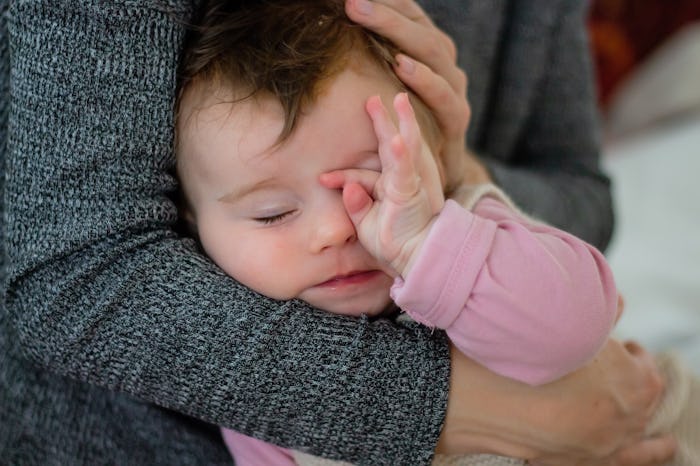Life

How Daylight Saving Time Will Affect Your Baby's Sleep
Fall has all the makings of the perfect season: boots, pumpkins, holidays, scarves, and bonfires. But there is only one flaw that comes with fall: daylight saving time (DST). Not only does DST mean you'll be walking out of work into darkness, it means a temporary adjustment in sleep habits. Having lived through time changes for so long, you know what it feels like for you, but how daylight saving time will affect your baby's sleep is another story. But the good news is, all your hard bedtime work won't be ruined forever.
It might feel frustrating when you think about how much effort has gone into getting your baby on a solid sleeping routine, only to have it all thrown out the window when you set your clocks back. The truth is, there will be an adjustment period for your baby's sleep. But the good news is, it's only temporary.
"He may be grumpy for awhile, but the more you stick to your routines, the faster he'll adjust to the time change," explained What to Expect.
So when bedtime and naps become a struggle, remind yourself that this too shall pass. Consider these five ways your baby's sleep with change with DST as a guide for making it through what may be a very long week.
1Their Circadian Rhythm Is Thrown Off
Everyone's body has an internal clock to determine the difference between sleeping and waking, called the circadian rhythm. Just the one hour time change for daylight saving time will affect your baby's natural sleep clock, as Today's Parent reported. Before she finds a new rhythm, your baby may be little extra cranky until she adjusts.
2They Will Wake Early
It takes a few days for your baby's body to match her internal clock to the actual clock on your wall. Because of this, your baby will wake up an hour earlier for the first few days after resting the clocks for Daylight Saving, according to the Baby Sleep Site.
3They'll Be Exposed To Light Too Soon
Aside from needing time to reset the circadian rhythm, early morning light can be a problem too. As The Bump reported, the sun is rising earlier during daylight saving time, which lights up your baby's room and prompts her to wake up. Try some black out shades or extra lined curtains to keep the room dark.
4Their Naps Are Thrown Off
It's easy to focus most of your energy into bedtime during a time change, but don't forget that naps will be affected as well. To keep all sleeping lined up for your baby, try doing whatever activity your child does before napping (eating lunch, playing, etc) earlier, so nap can happen at the same time as before the change.
5You May Need To Start Earlier
By gradually moving back your baby's bedtime in small chunks of time you can get ahead of the time it takes to adjust once the clocks move back, according to Parents magazine. Beginning the week before daylight saving time, start putting your child to bed 15 minutes earlier each night, so by the time the clock moves, she'll be used to going to bed at the right time.
This article was originally published on